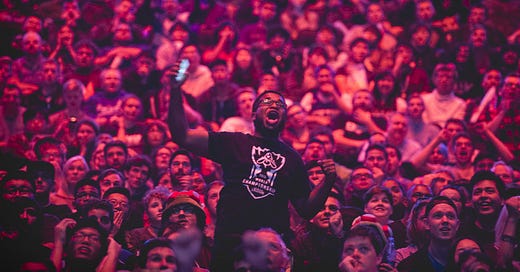Sharpr’s 2023 esports betting industry predictions
Sharpr is a weekly newsletter covering the intersection of esports and betting
Hi everyone, Cody here.
I’m throwing my own hat into the ring with some esports predictions of my own, as well as those of several key stakeholders in this space, including Unikrn, GRID, Rivalry, Luckbox, and more.
Let’s jump right in.
In this week’s edition of Sharpr…
Valorant will develop a strong betting culture.
Operators will break out in this category, or pivot elsewhere.
Regulation will continue to take shape in the United States.
If this newsletter was forwarded to you, please consider subscribing.
Sharpr’s 2023 esports betting industry predictions
You’ve asked for my predictions in esports betting and I’m here to share them.
This past year brought with it some interesting developments in the space, which I wrote about last week. This year is conceivably set to do the same with impending key regulation set to take shape in the United States, greater product diversity that can spur growth in the segment, and ongoing momentum that will bring increased attention to the space.
We’ll tackle all this and more below in Sharpr’s esports betting predictions for 2023.
Valorant will develop a strong betting culture
Released in Summer 2020, Valorant has quickly grown into one of the most popular games in the world.
Valorant has over 17M active players, according to Dexerto.
The VALORANT Champions Tour, its marquee esports tournament series, recorded 1.5M peak viewers.
Over $17M has been awarded in Valorant esports prize winnings since the game was released.
Valorant is seeing strong signs of momentum in its betting segment, too.
Moritz Maurer, CEO and founder of esports data company GRID, tells Sharpr that Valorant’s esports ecosystem is set to grow “significantly” in 2023. In March, GRID inked a two-year deal with developer Riot Games to become the exclusive Valorant data partner, and says the game is seeing inspiring levels of consumption in the betting space.
“We are looking at a game that has an incredibly high uptake across our commercial network of regulated sportsbook entities and has performed exceptionally well,” Maurer said.
When it comes to betting, Valorant is quickly making a name for itself. Rivalry recently reported that Valorant was the fourth most bet-on esport title in 2022, and the game saw a 264% year-over-year increase in volume. The consensus seems to be that it won’t be long before the title broaches the top three consisting of League of Legends, Dota 2, and Counter-Strike.
Speaking of, another important detail to note here is Valorant’s likeness to Counter-Strike. This advantage comes in several forms: familiarity and accessibility as a viewer, capturing a percentage of Counter-Strike’s player base, and notably, dovetailing off the game’s well-established betting culture.
The combination of Valorant’s popularity, rapidly maturing esports ecosystem, and similarity to Counter-Strike will serve as significant tailwinds for the title’s betting segment in 2023 and become an “essential” offering in esports betting, according to Maurer.
While not calling out Valorant specifically, Unikrn CEO Justin Dellario agreed that this year will yield more diverse offerings.
“We can expect diversification in game titles as wagering operators look to support and market more offerings than League of Legends, Dota 2 and Counter-Strike: Global Offensive, but these three games will still be the most popular titles for bettors.”
Operators will break out in this category, or pivot elsewhere
Being an esports operator ain’t easy.
Many different sportsbooks have attempted to break out in this category over the years. A few have managed to turn up a meaningful product and market share, but more have fallen flat.
It was only a few months ago that Esports Entertainment Group sunset its esports betting platform Vie, to name a recent example. Meanwhile, other operators (possibly more to come on this development at a later time) are quietly divesting from esports and rerouting spend to more profitable categories.
The reason why making a business from esports betting is difficult varies, and is not always reflective of the actual market opportunity. Operators like Betway, Luckbox, Rivalry, and GGBet have been around long enough to know that something is clicking.
But even outside the betting paradigm, reaching younger consumers is difficult. Accounting for a broad educational gap and general lack of awareness about esports betting, and you’ve got yourself a fairly challenging scenario to navigate as a business looking to turn a profit.
Establishing reliable consumer touchpoints, effective marketing, and a slick product design that the next generation is accustomed to are mandatory for operators that step into this space. These principles apply to most businesses, but for esports, the market is so narrow to that of traditional sports that a winning strategy needs to be in place early and executed with perfection to succeed.
In 2023, I expect that esports operators will either strike that balance and “make it,” or be forced to pivot focus to more conventional categories where greater financial upsides exists. This means deemphasizing esports in product offerings in favor of traditional sports and casino, as well as adding B2B offerings, as Luckbox unveiled in November.
A measured balance of diversification will be good for those able to pull it off, unlocking opportunities that can connect synergies between new offerings and assets to a younger and engaged demographic of users.
On the other hand, Dellario says that market diversity, particularly including those accessible to the viewer, will help drive material results for esports-specific books.
“More markets and offerings that are easy to understand and add to the viewing experience will spur growth in volume and economic viability for esports-focused operators.”
Regulation will continue to take shape in the U.S.
Regulation for esports wagering was a big topic last year.
This included watching an esports betting committee of experts formed by Nevada regulators work to foster greater opportunities for esports betting in the Silver State, and a similar advisory group coming together with a former New Jersey Division of Gaming Enforcement executive, among other developments.
Arguably the largest barrier for esports betting stateside is the regulatory environment. Without it, there are no opportunities to let esports prove its worth.
Currently, only 12 states include esports as part of its sports betting legislation. Even then, it continues to get a little more complicated than that.
Several states impose additional restrictions on esports which handicap the category considerably, ultimately making it a far less appetizing endeavor for operators.
New Jersey residents can place bets on esports up to $100, with a potential winning bet of up to $500, unless sanctioned by the NJDGE.
Nevada-licensed operators can offer bets on esports matches, but only with additional regulatory approval consisting of paperwork, time, and sometimes money.
Speaking to Nevada, UNLV International Gaming Institute Executive Director Dr. Brett Abarbanel told me last year that the regulatory process requires “a lot of streamlining.”
“There’s clearly a process and if nobody is applying for it, it’s potentially either too burdensome or it’s simply burdensome enough to not be worth going through it,” she said.
Operators and regulators in the U.S. are playing chicken with one another when it comes to esports betting.
Sportsbooks aren’t motivated to experiment with esports when regulatory agencies require navigating cumbersome approvals and low-margin bet limits are enforced. Meanwhile, regulators would likely take more prompt action to put systems in place to support esports betting if operators expressed more interest in it.
Abarbanel, who is one of eight members of Nevada’s esports committee, is on the frontlines of this effort, and driving meaningful change to the regulatory process in the state that is expected to take shape later this year.
In a more recent emailed statement last week, Abarbanel took an interesting position that esports would start to gain “mainstream” interest among regulators.
“I think 2023 will be the year we finally see esports in the U.S. become more mainstream for regulators and thus, more accepted and streamlined in speed-to-market at state-level regulation.”
Anthony Gaud, who founded the aforementioned Regulated Videogames and Esports Committee, says “states will get about regulating skill-based video games and esports wagering.”
“In the coming year, states will begin to take a stricter approach to regulating skill-based video games and esports wagering. This is due to the significant problems that have arisen in the currently unregulated gray market.”
Gaud says appropriate KYC, responsible gaming protocols, regulatory oversight, and taxation are all set to see an overhaul this year. He believes New Jersey and Nevada will be first to champion comprehensive regulations for esports (I tend to agree), and that skill-based esports betting operators (companies like Players’ Lounge and 1v1Me, for example) will be “required to obtain a license and comply with all relevant regulations and processes.”
Dellario also spoke to regulation, saying that it will evolve throughout 2023 with an emphasis on consumer protection and potential revenue kickbacks for rights holders.
“Regulation will be the central focus for online wagering this year as it continues to evolve, focusing in most cases on enhancing player protections and increasing revenues for licensors that will challenge business models around the industry.”
Esports betting will grow in South Asia
South Asia, and India in particular, is a bit of an “underdog,” according to Luckbox CEO Thomas Rosander. He’s betting the region has all the necessary ingredients to represent a meaningful share of the esports betting market.
“I think we can expect a lot from India and the South Asia region in the near future. The region is a bit of an underdog right now because of the challenges with affordable hardware, but with India having one of the youngest populations in the world, combined with the growing popularity of mobile gaming in the country and easier access to online content and tournaments, I think we can expect a big surge in viewership across this region soon,” he said.
🗞 In the news
Esports Entertainment Group has seen both its COO and CFO depart the company this week.
PandaScore has partnered with sports fantasy platform Dream11.
A proposed bill would permit esports wagering in Missouri.
Luckbox insists that the company will achieve profitability by Q2 2023.
📈 By the numbers
Over 22B hours of content were consumed on Twitch in 2022.
Entain completed its BetCity acquisition with an initial $325M payment.
DAZN BET parent company has paused its IPO plans as losses extend to $1.4B.








